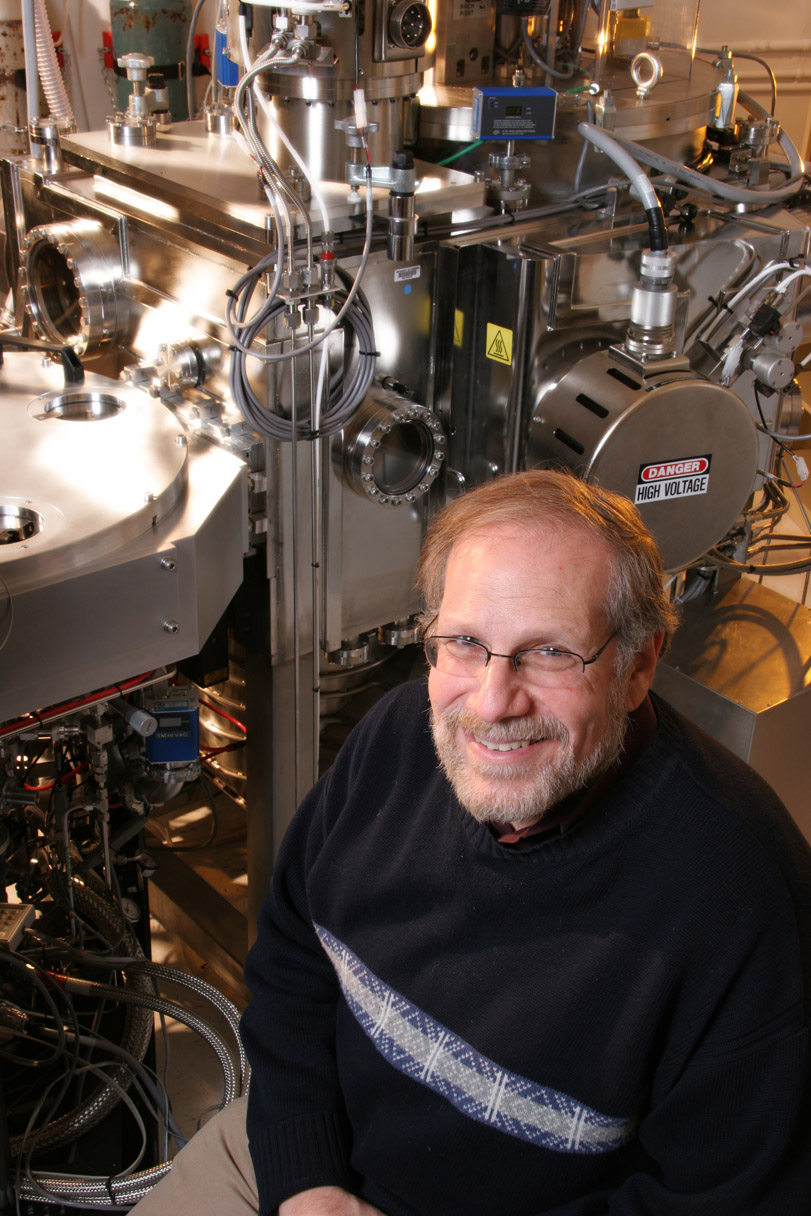February 12, 2008 – Stuart Wolf, a professor in both the University of Virginia's Department of Physics and its Department of Materials Science and Engineering, has been named the new director of U.Va.'s Institute for Nanoscale and Quantum Scientific and Technological Advanced Research, or "nanoSTAR."
Wolf was formally introduced during a reception on Feb. 12 in the Atrium of Wilsdorf Hall and shared his vision for the future of the institute, including the establishment of opportunities to apply for seed funding of interdisciplinary projects and the facilitation of multischool proposals.
Key changes with Wolf's appointment include a more multidisciplinary focus to nano and quantum science and technology research and education, and new research directions, to include nanoelectronics, medicine, energy and the environment. Wolf said he intends to solicit feedback from faculty and forge ties between the College of Arts & Sciences, School of Medicine, School of Engineering and Applied Science, Curry School of Education and the Darden School of Business. In addition, nanoSTAR will work to strengthen partnerships with other academic institutions, industry and national laboratories.
"NanoSTAR will push the frontiers of science, technology and medicine using the best people, tools and ideas," said Wolf. "The goal is to turn innovation and invention into convention."
Wolf came to U.Va. as a research professor in 2003 and became a full professor with a joint appointment in physics and materials science and engineering in 2004. He has been building research capacity in nanotechnology research through U.Va.'s SpinQuest Center since the summer of 2006. Wolf previously served as a program manager at the Defense Advanced Research Projects Agency, where he coined the term "spintronics" for a rapidly emerging area of nanoelectronics that uses the spin of electrons rather than their charge for data storage and logic in information systems. During Wolf's 12 years at DARPA, he conceived of and managed major programs involving academic, industrial, and government researchers.
"Stuart Wolf is recognized as a world leader in spintronics," said R. Ariel Gomez, vice president for research and graduate studies. "His track record of innovation in this area, his proven leadership at DARPA and his vision for nanoSTAR as a catalyst for multi-school research and education uniquely position him to lead the next phase of the institute's cutting-edge research initiatives."
Wolf was formally introduced during a reception on Feb. 12 in the Atrium of Wilsdorf Hall and shared his vision for the future of the institute, including the establishment of opportunities to apply for seed funding of interdisciplinary projects and the facilitation of multischool proposals.
Key changes with Wolf's appointment include a more multidisciplinary focus to nano and quantum science and technology research and education, and new research directions, to include nanoelectronics, medicine, energy and the environment. Wolf said he intends to solicit feedback from faculty and forge ties between the College of Arts & Sciences, School of Medicine, School of Engineering and Applied Science, Curry School of Education and the Darden School of Business. In addition, nanoSTAR will work to strengthen partnerships with other academic institutions, industry and national laboratories.
"NanoSTAR will push the frontiers of science, technology and medicine using the best people, tools and ideas," said Wolf. "The goal is to turn innovation and invention into convention."
Wolf came to U.Va. as a research professor in 2003 and became a full professor with a joint appointment in physics and materials science and engineering in 2004. He has been building research capacity in nanotechnology research through U.Va.'s SpinQuest Center since the summer of 2006. Wolf previously served as a program manager at the Defense Advanced Research Projects Agency, where he coined the term "spintronics" for a rapidly emerging area of nanoelectronics that uses the spin of electrons rather than their charge for data storage and logic in information systems. During Wolf's 12 years at DARPA, he conceived of and managed major programs involving academic, industrial, and government researchers.
"Stuart Wolf is recognized as a world leader in spintronics," said R. Ariel Gomez, vice president for research and graduate studies. "His track record of innovation in this area, his proven leadership at DARPA and his vision for nanoSTAR as a catalyst for multi-school research and education uniquely position him to lead the next phase of the institute's cutting-edge research initiatives."
Media Contact
Article Information
February 12, 2008
/content/stuart-wolf-named-new-leader-university-virginias-nanotechnology-efforts

